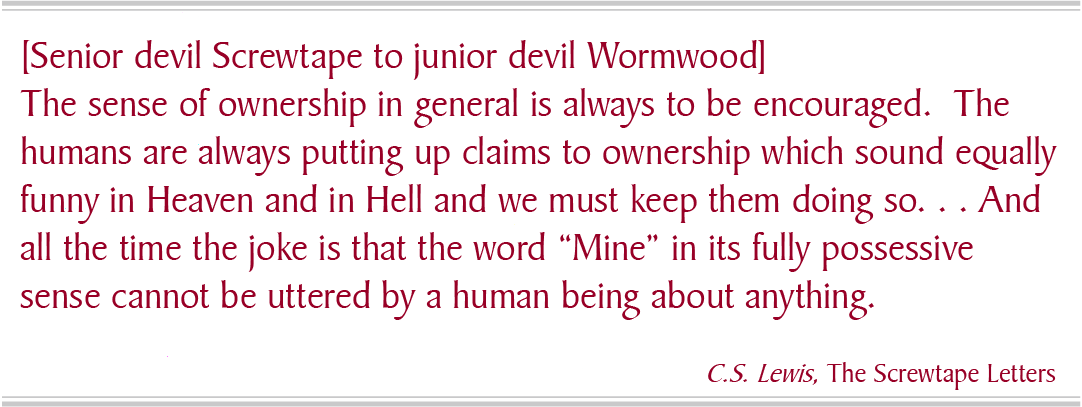Back to series



What is My Relationship to My Stuff?
Click here to open a Print - Friendly PDF
This is clearly the most foundational question we must answer if we are going to make any progress in our attitudes, perspectives, and decisions in relation to material things—particularly material wealth. If we cannot answer this question with clarity and confidence, we will find ourselves—in spite of our financial successes—underachieving in our lives. If you think of this question as a stool with three legs upon which the answer is balanced, you will be able to better envision the truth about your stuff.
Leg 1
The first leg of this stool is the fact that God owns everything because He created everything. King David tells us in Psalm 24:1, “The earth is the Lord’s and all it contains, the world, and those who dwell in it” (NASB). He goes on to add in Psalm 50:10–12 (CEV),
Every animal in the forest belongs to me, and so do the cattle on a thousand hills.
I know all the birds in the mountains, and every wild creature is in my care.If I were hungry, I wouldn’t tell you, because I own the world and everything in it.
Not only did God create everything that exists, He used all of His own materials to build it. So He truly is the only One who can claim to own anything.
If we build something, we may claim it is ours, but if we use someone else’s materials to build it, then the owner of those materials can lay some claim to it as well. But in God’s case, He not only dreamed it all up, He used His own creative materials to build it.
Leg 2
The second “leg” of this stool is the fact that not only did God create us, but He also redeemed us from slavery to the prince of this world through the death of His son, Jesus Christ. Paul tells us in Titus 2:13b–14,“Christ Jesus, who gave Himself for us to redeem us from every lawless deed, and to purify for Himself a people for His own possession, zealous for good
deeds” (NASB).
This word redeem that Paul uses here is no longer commonly used in our culture today. When I was a young boy it was used often. I remember going to the grocery store with my mother. At the checkout counter, she would be given a certain number of S&H Green Stamps, depending on how large her grocery purchase was. The reason I remember this so well is because I was charged with the task of licking those “tasty” little stamps and then putting them into the books.
My mother had a catalog filled with all kinds of products—everything from small kitchen appliances to a car. I was hoping my mother was not saving stamps for the car because it was several thousand Green Stamp books. I could see my tongue being forever stuck to the roof of my mouth from licking that many stamps! What made the Green Stamp catalog so unusual was that instead of having prices for each item, it had the number of S&H Green Stamp books needed. A hand mixer might be four and a half books and a television 120 books. Do you remember the name of the place where you went to get these products? It was called the Redemption Center. It was the place where you would take your Green Stamp books to redeem the item you wanted.
 In other words, you traded in your stamp books for something you wanted to own. This is what God did with Jesus. God was willing to redeem us by offering the blood of His own Son, so He could again own us—“a people for His own possession.” You see, God owns Christians twice—once because He made us and the second time because He bought us back after we were lost.
In other words, you traded in your stamp books for something you wanted to own. This is what God did with Jesus. God was willing to redeem us by offering the blood of His own Son, so He could again own us—“a people for His own possession.” You see, God owns Christians twice—once because He made us and the second time because He bought us back after we were lost.
One last thought on this leg: what was the reason Paul gave in Titus 2:14 for why God was willing to redeem us? It was so we could be “zealous for good deeds.”
Leg 3
The final leg is the fact that we own nothing. We are called by God to be stewards, carrying out the Owner’s wishes for His property. It is at this point that we need to come to grips with the terribly misused and abused concept of stewardship.
Before I focus on what stewardship does mean, let me tell you what it does not mean. Churches routinely use the term stewardship to refer to their capital campaigns. These campaigns are simply fund-raisers used to get church members to give. But since fund-raiser has such a negative connotation, they substitute (incorrectly) the seemingly nobler phrase stewardship drive.
You will often hear churches and pastors use stewardship as a synonym for tithing. I have seen in many church papers and bulletins the term stewardship used as a heading to report the weekly offerings and attendance. All of these uses that link stewardship to giving and tithing are inadequate at best—and entirely wrong at worst.
By definition, a steward is “a person who manages another’s property or financial affairs; one who administers anything as the agent of another or others, a manager.” So for us to be “stewards for God,” we must acknowledge that all we are and all we have possession of belongs to Him. We are charged with managing His property according to His wishes.

You can see that stewardship is not at all a synonym for tithing and fund-raising; it is actually the opposite. Tithing has to do with what you give; stewardship has to do with what you keep. In other words, it is about how you manage everything that you have been entrusted to oversee. What most people miss is that stewardship is more about how you manage what is left over after you give than it is about what you give.
The radical, biblical concept of stewardship is easy enough to understand intellectually. However, it is anything but easy to consistently apply and live out. So what is your relationship to your stuff? You are not the owner; you are merely the caretaker of somebody else’s property. And it is your job to manage all of it according to the Owner’s wishes. Now, that really changes the game, does it not?
| Note: This article comes from: E.G. “Jay” Link, Who’s in Charge Here?, Life Stewardship Series Curriculum, Session 1, Lesson 1 (Mooresville, IN: Stewardship Ministries, 2013), 7–10. © 2010 Stewardship Ministries | All Rights Reserved. |
|||

E.G. “Jay” Link
TeacherE.G. “Jay” Link is the president of Stewardship Ministries, a teaching, training, mentoring and content ministry working with churches and nonprofit leaders to equip them with the biblical knowledge and training resources needed to serve all ages and all economic levels of believers to effectively live as good and faithful stewards of all that God has entrusted to them. He is the author of four books including Spiritual Thoughts on Material Things: Thirty Days of Food for Thought and To Whom Much Is Given: Navigating the Ten Life Dilemmas Affluent Christians Face. He has also written over 100 articles on the topic of strategic stewardship and creative giving. He earned his MDiv in Biblical Theology.

 COPYRIGHT: This publication is published by C.S. Lewis Institute; 8001 Braddock Road, Suite 301; Springfield, VA 22151. Portions of the publication may be reproduced for noncommercial, local church or ministry use without prior permission. Electronic copies of the PDF files may be duplicated and transmitted via e-mail for personal and church use. Articles may not be modified without prior written permission of the Institute. For questions, contact the Institute: 703.914.5602 or email us.
COPYRIGHT: This publication is published by C.S. Lewis Institute; 8001 Braddock Road, Suite 301; Springfield, VA 22151. Portions of the publication may be reproduced for noncommercial, local church or ministry use without prior permission. Electronic copies of the PDF files may be duplicated and transmitted via e-mail for personal and church use. Articles may not be modified without prior written permission of the Institute. For questions, contact the Institute: 703.914.5602 or email us.
-
Recent Podcasts
From Politics to Pampers
by Michelle Morgan Knott, Aimee Riegert on November 15, 2024A stay-at-home mom shares life and spiritual lessons...Read More
-
An Unexpected Change – David Westerhoff’s Story
by David Westerhoff on November 8, 2024
-
The Faith of Jonathan Edwards
by Aimee Riegert, Arthur W. Lindsley on November 1, 2024
-
Recent Publications
Will You Be Ready?
by Thomas A. Tarrants on October 23, 2024Tom Tarrants gives insights on how we can...Read More
-
Should Christians Be Involved with Politics?
by Kerry A. Knott on October 1, 2024
-
Isn ’t Atheism Based on Scientific Fact Whereas Christianity is Based on “Faith”?
by Cameron McAllister on September 1, 2024
0
All Booked
0.00
All Booked
0.00
All Booked
23169
ADVENT CALENDAR: The Amazing Prophecies Fulfilled by the Birth of Jesus Christ
https://www.cslewisinstitute.org/?event=advent-calendar-the-amazing-prophecies-fulfilled-by-the-birth-of-jesus-christ&event_date=2024-11-28®=1
https://www.paypal.com/cgi-bin/webscr
2024-11-28

Next coming event
Days
Hours
Minutes
Seconds
ADVENT CALENDAR: The Amazing Prophecies Fulfilled by the Birth of Jesus Christ
On November 28, 2024 at 6:00 amSpeakers

E.G. “Jay” Link
Teacher
Team Members

E.G. “Jay” Link
TeacherE.G. “Jay” Link is the president of Stewardship Ministries, a teaching, training, mentoring and content ministry working with churches and nonprofit leaders to equip them with the biblical knowledge and training resources needed to serve all ages and all economic levels of believers to effectively live as good and faithful stewards of all that God has entrusted to them. He is the author of four books including Spiritual Thoughts on Material Things: Thirty Days of Food for Thought and To Whom Much Is Given: Navigating the Ten Life Dilemmas Affluent Christians Face. He has also written over 100 articles on the topic of strategic stewardship and creative giving. He earned his MDiv in Biblical Theology.





